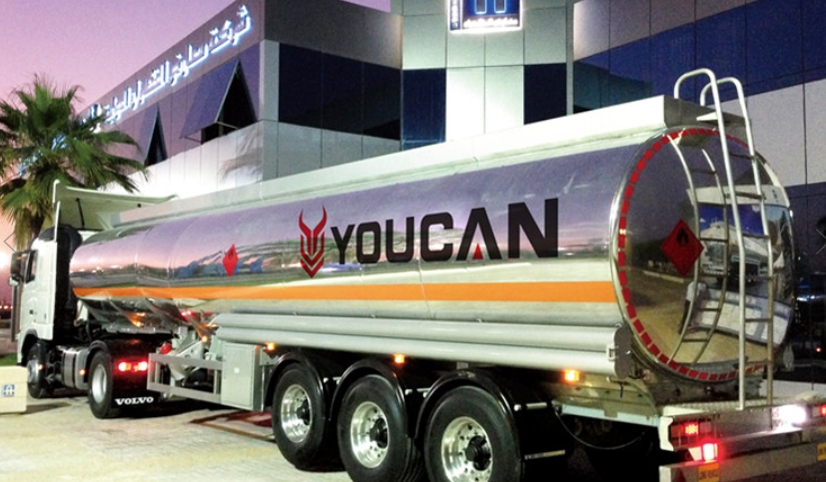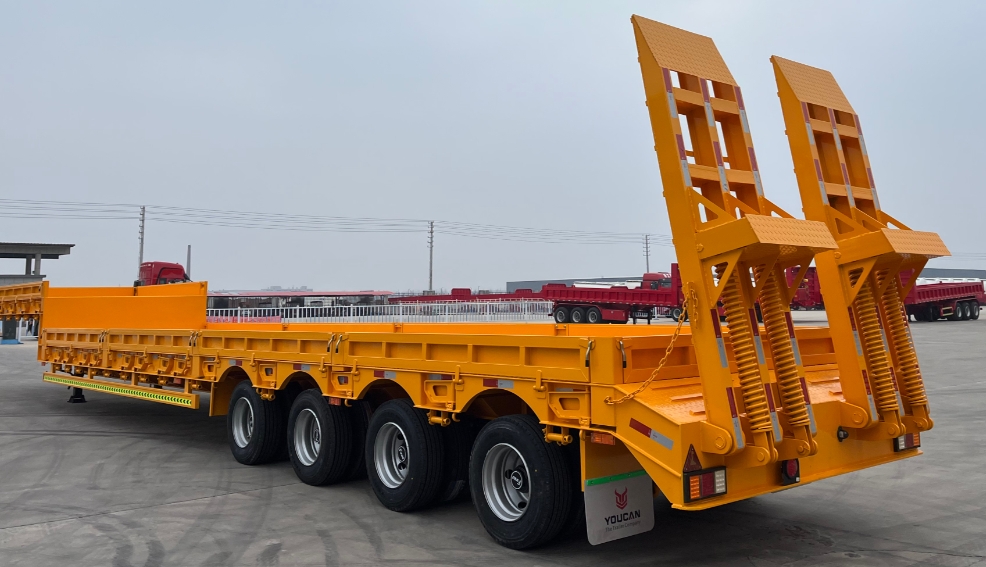Flatbed Trailers Buying Guide
What are Flatbed Trailers?
A flatbed trailer is a type of open, versatile transportation equipment with a flat, unenclosed design. It is typically used to haul large, heavy, or irregularly shaped cargo. Designed to hook up to a tractor or towing vehicle, flatbed trailers are an essential component in the transportation and logistics industry.
Made from sturdy materials such as steel or aluminum, flatbed trailers are designed to withstand the rigors of heavy-duty transportation. They come in various sizes and configurations, including standard, step-deck, and double-drop deck, each suited for specific cargo types and transportation needs.
What do Flatbed Trailers do?
Flatbed trailers serve the purpose of transporting large, bulky, or unique items which cannot normally be contained within a traditional, enclosed trailer. Flatbeds are commonly employed in various industries to haul a diverse range of equipment and materials, such as:
Construction materials like wood, steel beams, concrete blocks, and bricks.
Heavy machinery or equipment like excavators, bulldozers, and cranes.
Large containers, prefabricated structures, and mobile homes.
Farm equipment, such as tractors, plows, and harvesters.
Wind turbine components, pipelines, and other specialized oversized cargo.
Flatbed trailers offer freedom and flexibility, as they allow for quick and easy loading and unloading from the side, top, or rear. This is particularly useful for industries that require quick transportation and handling of perishable or time-sensitive materials.
Why Are Flatbed Trailers So Important?
Flatbed trailers play a critical role in the transportation and logistics network. They are essential for several reasons:
Adaptability: Flatbed trailers accommodate various cargo types, shapes, and sizes, which makes them indispensable in a wide range of industries.
Efficiency: Open design facilitates faster loading and unloading, cutting down on manual labor, and reducing the overall delivery time.
Specialized transport: Flatbeds make it possible to transport large or oversized cargo, which would be difficult or impossible to move using conventional trailers.
Safety: Securing loads on a flatbed trailer with straps or chains is usually easier than in a closed container, enhancing transportation safety.
In conclusion, flatbed trailers play a vital role in the efficient movement of goods across different industries, thus contributing to global economic growth. Their versatility, adaptability, and usefulness make them an indispensable part of the transportation infrastructure.
How to Maintain Flatbed Trailers
Flatbed trailers are a vital piece of equipment for many industries, including construction, logistics, and agriculture. They enable efficient transportation of heavy machinery, bulky cargo, and oversized items. Proper maintenance of flatbed trailers is essential to ensure their longevity and safe operation. In this article, we will discuss some useful tips to maintain flatbed trailers and explore the sales and prices of different types of these trailers.
Proper Loading and Unloading of Cargo
Proper loading and unloading practices play a crucial role in maintaining the structural integrity and safety of a flatbed trailer. Ensure loads are balanced and evenly distributed to avoid excessive stress on the trailer bed. Additionally, never exceed the load capacity of the trailer, and always secure cargo properly to prevent movement during transit.
Regular Cleaning and Inspection
Clean the flatbed regularly, especially after transporting dirty or dusty cargo. This will prevent rust, corrosion, and long-term damage. Conduct thorough inspections to identify and address any worn or damaged components, such as tires, brakes, lights, and load-bearing structures.
Lubrication and Protection
Regularly lubricate the trailer's moving parts, such as wheel bearings and suspension components, to minimize wear and tear. Also, consider applying a rust-resistant coating to the flatbed surface to protect it from corrosion.
Tire Maintenance
Inspect trailer tires frequently to check for adequate inflation, uneven wear, or damage. Rotate the tires to ensure even wear and replace them when necessary. Maintaining proper tire condition is imperative for the safety of both the trailer and the cargo.
Annual Professional Inspection
Finally, schedule annual professional inspections to ensure that your flatbed trailer is safe and complies with all regulations. A certified mechanic can identify and address potential issues that may otherwise go unnoticed.
Sales and Prices of Different Types of Flatbed Trailers
There are various types of flatbed trailers on the market, catering to different needs and budgets. Three common types include:
Standard Flatbed Trailers: These versatile trailers have a flat, open platform suitable for transporting a wide variety of cargo. Prices typically range from10,000 to 30,000, depending on factors like size, load capacity, and materials.
Drop Deck Flatbed Trailers: Also known as step-deck trailers, they have a lowered bed to accommodate taller cargo. Prices vary based on the size and features, but you can expect to pay between20,000 and 50,000 for a new drop deck trailer.
Extendable Flatbed Trailers: These trailers are adjustable in length, making them ideal for transporting excessively long items. They typically command a higher price due to their specialized design, with new models starting at around 40,000 and reachingashighas 80,000 or more.
The actual sales and prices of flatbed trailers depend on various factors, such as the manufacturer, material, features, and availability. Always research and shop around to identify the best trailer to suit your needs and budget. And, of course, don't forget to factor in maintenance costs to keep your investment in top shape for years to come.
Flatbed Trailers Common Technical Troubleshooting FAQs
Flatbed trailers offer an essential transport solution for various industries across the globe. However, like all heavy-duty equipment, they can encounter technical issues that can impact their efficiency and productivity. In this article, we will address some common technical troubleshooting FAQs to help you maintain and manage your flatbed trailer.
Q1: The brakes on my flatbed trailer aren't working properly. What should I do?
A: Brake failure or inefficiency is a critical safety concern. Start by inspecting your trailer's brake system, including the brake fluid levels, hydraulic lines, brake pads, and the brake controller. If any parts are damaged or corroded, have them replaced immediately by a certified technician to avoid further complications.
Q2: My flatbed trailer's tires are wearing unevenly. What could be causing this?
A: Uneven tire wear can result from several factors, such as overloading the trailer, misaligned axles, or unbalanced tire pressure. Check your trailer's loading capacity to ensure it's not overloaded and monitor tire pressure consistently. If the issue persists, consult a professional technician for an alignment and suspension check.
Q3: My trailer lights aren't working. How can I fix this?
A: Trailer light issues can arise from blown fuses, corroded connections, frayed wires, or faulty bulbs. First, inspect the cables, bulbs, and connections for visible damage, and replace them as needed. If the problem is not apparent, use a multimeter to test fuses and electrical connections. Contact a professional technician if you're unsure about diagnosing or fixing the problem.
Q4: The suspension on my flatbed trailer is not functioning properly. What steps can I take to troubleshoot it?
A: A malfunctioning suspension system can negatively impact your trailer's ride quality and overall safety. Assume responsibility for inspecting the trailer's leaf springs, airbags, and bushings for wear, damage, or cracks. Replace any parts that are in poor condition and reach out to a reputable technician if the problem persists.
Q5: Why is my flatbed trailer swaying while driving?
A: Trailer sway can result from various factors, including inadequate tongue weight, uneven load distribution, or improper hitching. To rectify this issue, make sure that your trailer is correctly hitched and its weight is evenly distributed, maintaining around 10-15% tongue weight. Invest in a sway control system if your trailer continues swaying while on the road.
As an asset in freight transportation, it's vital to keep your flatbed trailer in optimal condition. If you encounter any of the technical issues mentioned above, troubleshoot them safely and consult a certified technician when in doubt. Regular preventive maintenance and addressing issues as they arise ensures your trailer's longevity and a safe transport experience.
Suppliers of Container Chassis
The Youcan trailer was established in 1999 and has rich experience in Interlink Trailers production and provides complete Interlink Trailers solutions for different applications. The company has 23 years of experience and specializes in providing aluminum tank trucks, fuel tank trucks, bulk cement tank trucks, dump trailers, tipper trailers, pile/sidewall trailers, flatbed trailers, low bed trailers, container transport trailers, cargo trailers, interlock trailers and hundreds of other products.
Welcome to contact us to get the latest price of new semi-trailers. Competitive price, reliable quality, waiting for you to buy!

 WhatsApp
WhatsApp
 sales@youcantrailer.com
sales@youcantrailer.com
 +8615203709888
+8615203709888


